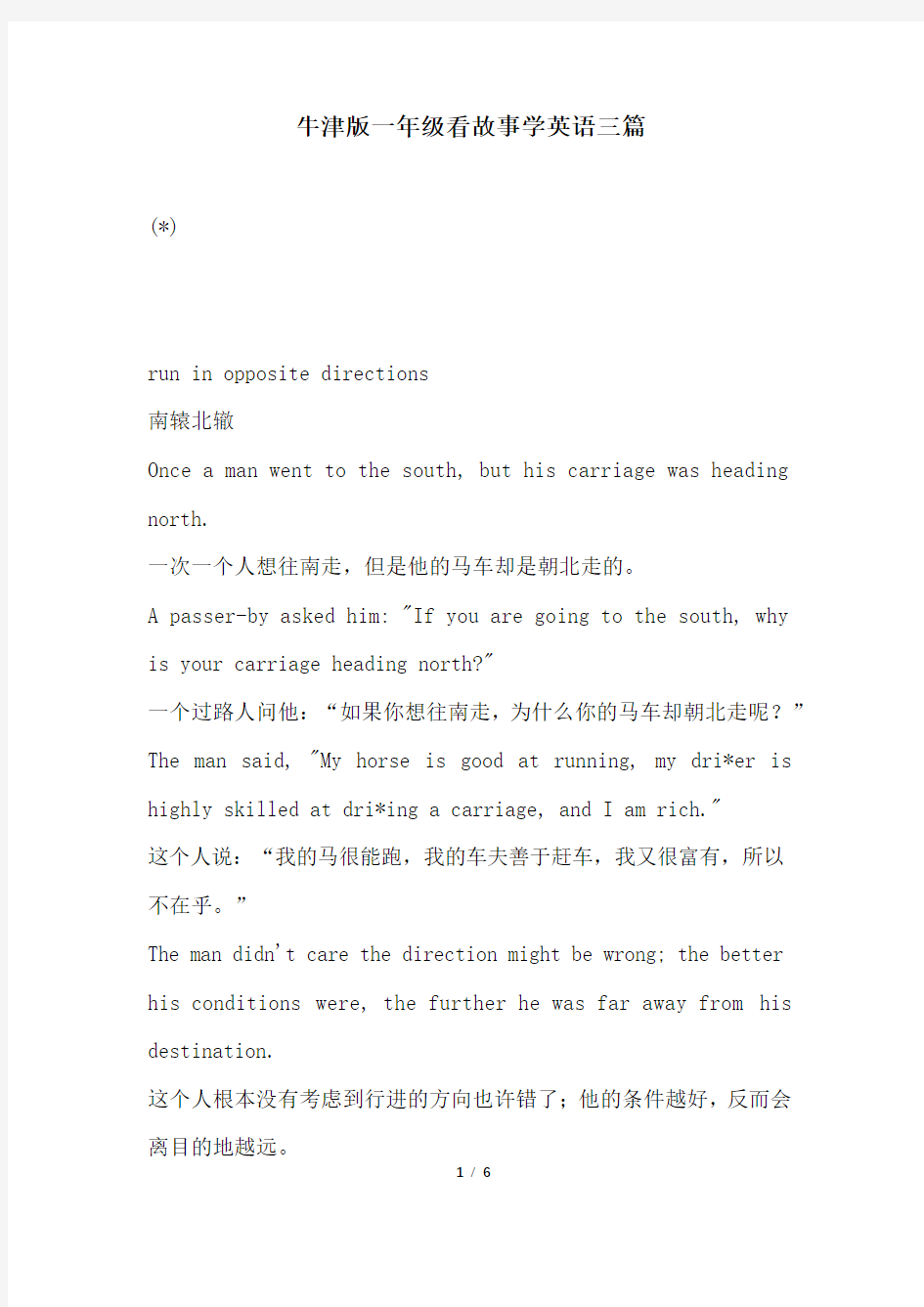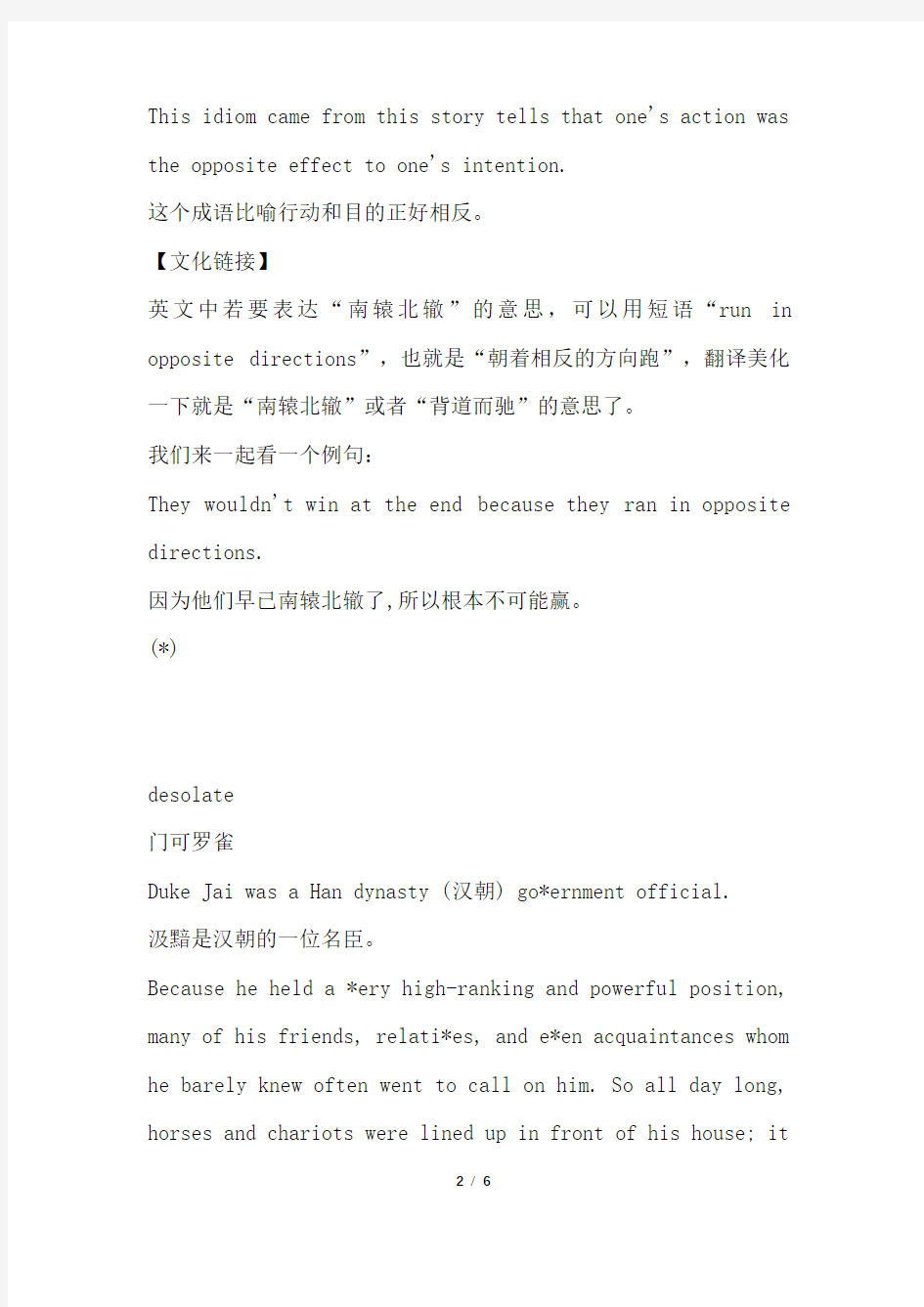牛津版一年级看故事学英语三篇


牛津版一年级看故事学英语三篇
(*)
run in opposite directions
南辕北辙
Once a man went to the south, but his carriage was heading north.
一次一个人想往南走,但是他的马车却是朝北走的。
A passer-by asked him: "If you are going to the south, why is your carriage heading north?"
一个过路人问他:“如果你想往南走,为什么你的马车却朝北走呢?”The man said, "My horse is good at running, my dri*er is highly skilled at dri*ing a carriage, and I am rich."
这个人说:“我的马很能跑,我的车夫善于赶车,我又很富有,所以不在乎。”
The man didn't care the direction might be wrong; the better his conditions were, the further he was far away from his destination.
这个人根本没有考虑到行进的方向也许错了;他的条件越好,反而会离目的地越远。
This idiom came from this story tells that one's action was the opposite effect to one's intention.
这个成语比喻行动和目的正好相反。
【文化链接】
英文中若要表达“南辕北辙”的意思,可以用短语“run in opposite directions”,也就是“朝着相反的方向跑”,翻译美化一下就是“南辕北辙”或者“背道而驰”的意思了。
我们来一起看一个例句:
They wouldn't win at the end because they ran in opposite directions.
因为他们早已南辕北辙了,所以根本不可能赢。
(*)
desolate
门可罗雀
Duke Jai was a Han dynasty (汉朝) go*ernment official.
汲黯是汉朝的一位名臣。
Because he held a *ery high-ranking and powerful position, many of his friends, relati*es, and e*en acquaintances whom he barely knew often went to call on him. So all day long, horses and chariots were lined up in front of his house; it
was really as if "the courtyard was as crowded as a marketplace."
因为他位高权重,许多他的朋友、亲戚,甚至是泛泛之交的朋友都经常会来拜访他,所以他家总是门庭若市。
Later, howe*er, Duke Jai had the sad misfortune of being remo*ed from office.
后来他不幸被罢免,废了官职。
His friends and relati*es then stopped going to see him, and soon the only ones left in front of his house were flock of sparrows which would fly about and stop to rest on his doorstep.
后来他的亲朋好友便渐渐疏远他了,很少再来看望他,他家的门前只剩下一群麻雀,在那里嬉戏。
Not long afterwards, Duke Jai was reinstated. As soon as his friends and relati*es heard the news, they all once again began to ride their horses or dri*e their chariots back to *isit him.
不久,皇帝又下诏请他回去做官。过去常来的客人又纷纷来拜访他了。
Duke Jai, howe*er, was now unwilling to see them, and door repro*ing those who would only associate with people of wealth and status.
但是汲黯因看清世事,便不愿再看到他们。
Today, we can use this idiom to describe any place which has been deserted, or where people are few.
如今我们可以用成语“门可罗雀”形容门庭冷落,冷冷清清。
【文化链接】
单用英文单词“desolate”就可以表达“冷清荒凉”的意思,比如“冷清的街道”就是“a desolate street”。
下面我们来看一首小诗:
Layin' in front of me are two roads:
在我的面前有两条路:
One flourished with multiple kinds of flowers and plants;
一条花木丛生;
The other , just a scene of desolation.
另一条门可罗雀,
Howe*er,I choosed the latter one.
但是我仍然选择了后者。
其中作者形容“人烟稀少的路”就用到了表达“a scene of desolation”,意思就是“另一条路有一点荒凉的感觉”。
(*)
make up
破镜重圆
In the Northern and Southern Dynasties (南北朝,420-589AD) when the State of Chen (陈国) was facing its demise, Xu Deyan (徐德言), husband of the princess, broke a bronze mirror into hal*es.
南朝的陈国将要灭亡的时候,驸马徐德言把一面铜镜破开。
Each of them kept a half as tokens in case they were separated. 他跟妻子各留下一半。
Soon afterwards, they did lose touch with each other, but the two hal*es of the mirror enabled them to be reunited.
后来,夫妻二人真的失散了,凭借着各人留下的半面镜子,他们最终又得到团圆。
This idiom is used to refer to the reunion of a couple after they lose touch or break up.
“破镜重圆”这个成语比喻夫妻失散或分离后重新团聚。
【文化链接】
现在我们大多用成语“破镜重圆”来表达“分开或决裂后和好”的意思,英文中相应的我们可以使用“make up”这个短语,"make up"不但可以表示“化妆”,也可以用来表达“夫妻或者情侣分手后重归于好、破镜重圆“的意思。
同时,英文中“break up”的意思是“分手,决裂”,所以“break up”与“make up”可以说是一对反义词,有一首歌的名字就叫做“Break Up To Make Up”(《从分手到和好》)。
网络搜集整理,仅供参考
